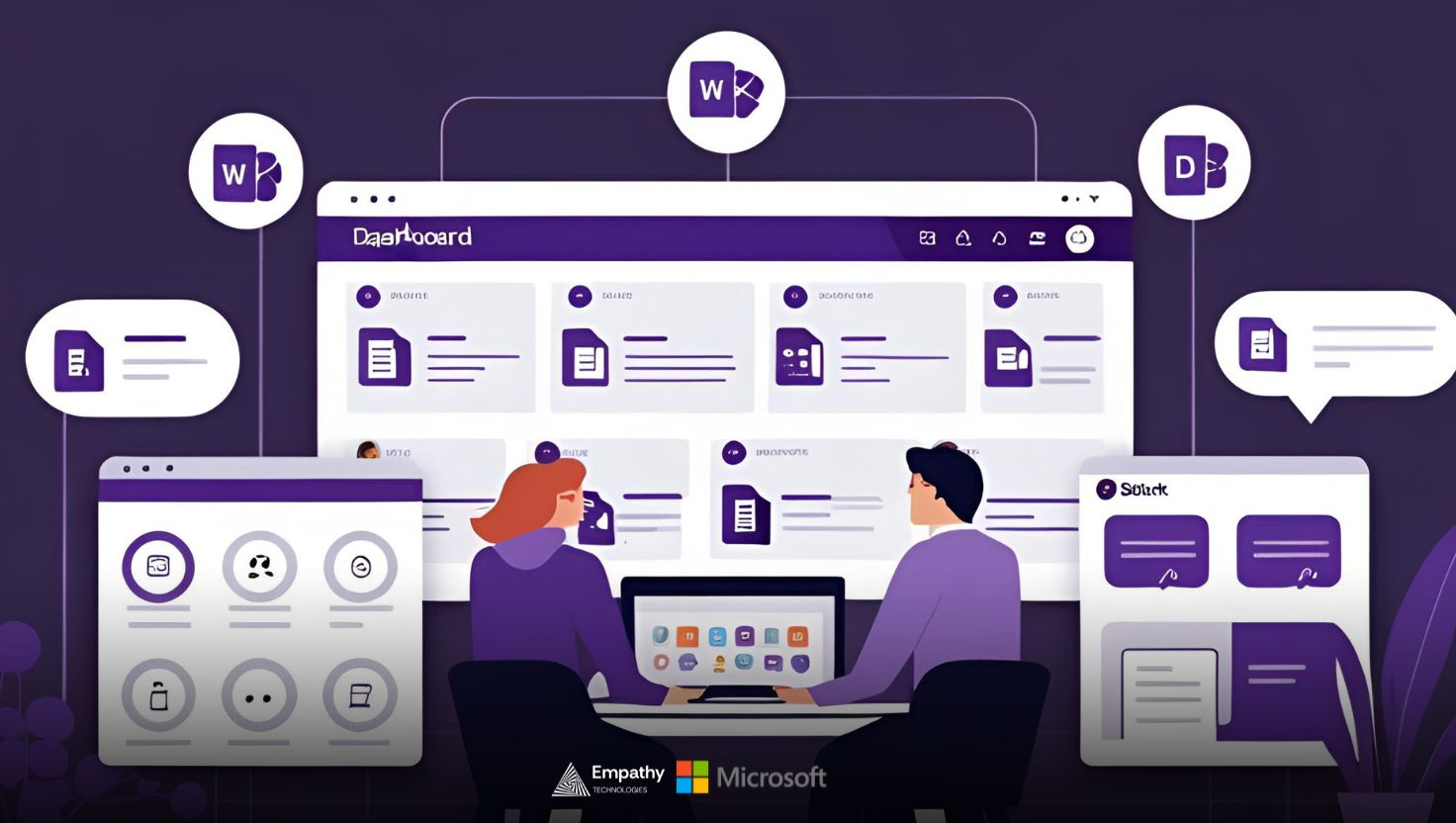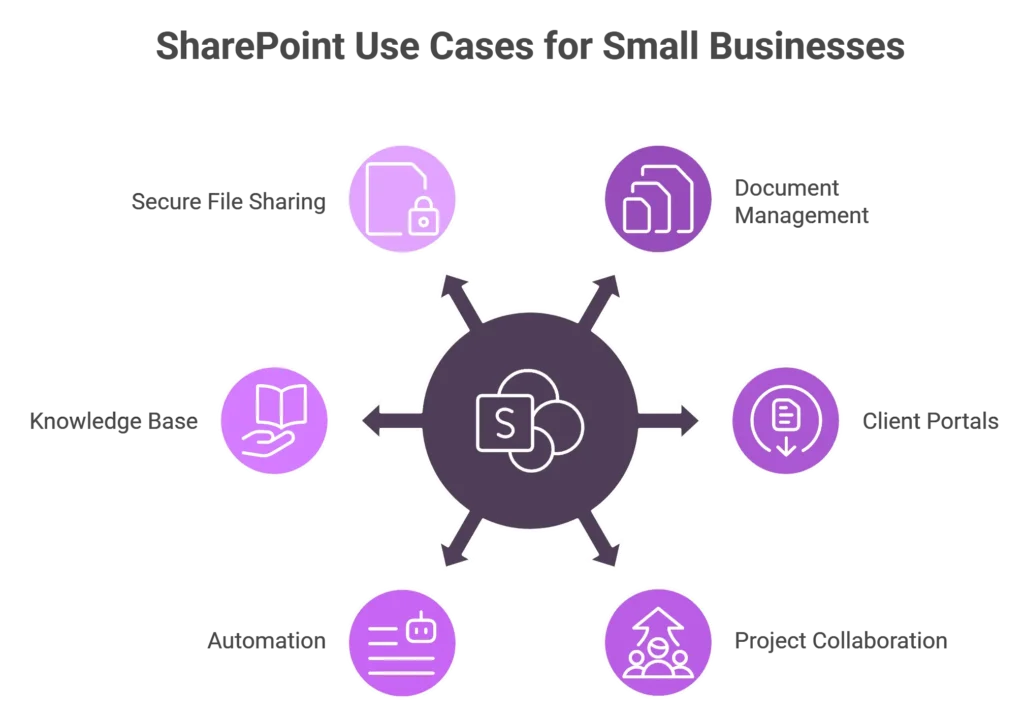
Is SharePoint Right for Small Businesses? (2025 Guide)
Small businesses today need enterprise-level collaboration tools—but without enterprise-level complexity or cost. The challenge? Finding a platform that grows with you while staying simple enough for your team to actually use.
SharePoint for small businesses has become a hot topic, and for good reason. But is it the right fit for your company? This guide covers everything you need to know: SharePoint pros and cons, real-world use cases, hidden features you might miss, and practical advice to help you decide with confidence.
By the end, you’ll know whether SharePoint deserves a spot in your business toolkit—or if you should look elsewhere.
What Is SharePoint?
Think of SharePoint as your company’s digital headquarters. It’s a web-based platform that lets you store, organize, and share documents while your team collaborates in real time. Part of Microsoft 365, it creates a private intranet that only your team (and approved external users) can access.
How It Works for Remote & Hybrid Teams
Here’s the straightforward explanation: SharePoint lives in the cloud, so your team can access company files from anywhere—home, office, or that coffee shop down the road. No more “I left the file on my work computer” excuses.
When someone updates a document, everyone sees the changes instantly. Multiple people can edit the same file at the same time—without creating those dreaded “Final_Version_2_ACTUAL_FINAL.docx” nightmares.
Pros of Using SharePoint for Small Businesses
Here are the key benefits that make small business owners take notice:
Centralized Document Storage & Search
All your important files live in one secure location. The search function is powerful enough to find documents by name, content, or custom tags you create.
Real-Time Collaboration
Your team can edit documents together, leave comments, and track changes—all happening simultaneously. No more email chains with different versions floating around.
Microsoft 365 Integration
Works seamlessly with Teams, Outlook, Excel, and Power Automate. If you’re already using Microsoft tools, SharePoint fits right in.
Version History & Restore Options
Accidentally deleting something important? SharePoint keeps version history so you can restore previous versions or recover deleted files.
External Sharing with Clients & Vendors
Create secure portals where clients can access project files, invoices, or updates without cluttering your main workspace.
Scalable from 5 Users to 500+
Start small and grow. SharePoint adapts whether you’re a five-person startup or expanding into a larger operation.
Cons & Limitations for Small Businesses
SharePoint isn’t perfect. Here are the challenges to consider:
Steeper Learning Curve for Beginners
If your team struggles with basic computer tasks, SharePoint might feel overwhelming at first. The interface has many features, and finding what you need takes practice.
Risk of Feature Overload for Small Teams
SharePoint includes dozens of features. Smaller businesses might end up paying for functionality they’ll never use—like complex workflow automation for a three-person team.
Requires Governance to Avoid Clutter
Without clear rules for folder structure and naming conventions, SharePoint can become as messy as the shared network drive you’re trying to replace.
Some Setup Steps Need IT Expertise
Basic setup is straightforward, but advanced configurations, permissions, and integrations often require technical knowledge.
Internet Dependency for Cloud Access
If your internet goes down, so does access to your files—although you can sync some files locally via OneDrive.
Subscription Cost vs Free Alternatives
Monthly fees add up. If you only need basic file sharing, free options like Google Drive may seem more appealing.
Common Myths About SharePoint for Small Businesses
Let’s clear up a few misconceptions:
Myth: “It’s only for large corporations.”
Reality: Microsoft offers SharePoint plans tailored for small businesses. You don’t need hundreds of employees to benefit from organized document management.
Myth: “It’s too expensive.”
Reality: SharePoint is included in most Microsoft 365 Business plans, starting around £4.70 per user per month. When it replaces multiple tools, the cost often balances out.
Myth: “It’s just cloud storage.”
Reality: SharePoint offers workflow automation, intranet capabilities, client portals, and integration with dozens of business applications—far beyond simple file storage.
Key Use Cases for Small Businesses

Here’s where SharePoint really shines for smaller companies:
- Document Management & Version Control – Keep track of contracts and project files with version history and check-in/check-out controls.
- Client & Vendor Portals – Branded spaces for clients to access invoices, updates, or important documents—without touching your internal files.
- Project Collaboration Across Teams – Keep project documents, timelines, and communications in one place.
- Automating Approvals & Repetitive Tasks – Use workflows for expense approvals, holiday requests, or document reviews.
- Internal Knowledge Base & Training Hub – Store procedures, training materials, and FAQs in one easily accessible location.
- Secure File Sharing for Legal/Finance Docs – Share sensitive documents with controlled access, set expiry dates, and track views.
Advanced SharePoint Features Small Businesses Overlook
Most small businesses only scratch the surface. These features can unlock even more value:
- Metadata Tagging for Faster Search – Tag documents with project codes, client names, or document types for quick retrieval.
- Data Retention & Compliance Policies – Automate document lifecycle management, crucial for regulated industries.
- Integration with CRM, ERP & HR Systems – Ensure seamless data flow between systems.
- AI-Powered Search with Microsoft Copilot – Use natural language queries for intelligent results.
- Offline Document Sync via OneDrive – Work offline and sync changes automatically later.
- Low-Code Apps via Power Apps – Build custom business apps like expense trackers or booking systems without coding.
Cost vs ROI – The Real Value for SMBs
Subscription Pricing
SharePoint is bundled with Microsoft 365 Business plans. Basic plans start at around £4.70 per user/month, while premium plans with advanced features cost about £17.60 per user/month.
Savings from Replacing Other Tools
It can replace multiple separate subscriptions for file storage, project management, and communication—often reducing total costs.
Long-Term Scalability & Compliance
As you grow, SharePoint grows with you—avoiding costly migrations. Built-in compliance tools can save on future consultancy fees.
Best Practices for Small Business SharePoint Success
- Start Small with One Department or Site – Pilot with a single team before scaling.
- Train Staff in Short, Practical Sessions – Focus on specific skills like uploading documents or collaborating on a project plan.
- Create a Governance Plan Early – Define naming conventions, folder structures, and site creation rules.
- Use Templates for Consistency – Standardize documents and project sites.
- Review Permissions Regularly – Remove outdated access promptly.
- Track Adoption via Usage Analytics – Monitor which features are actually used and adjust training or setup.
Why Choose Empathy Technologies for Your SharePoint Journey
Implementing SharePoint isn’t just about the technology—it’s about creating systems that truly support your team.
- SMB-Focused Implementation Packages – Solutions designed for small business needs, not overwhelming enterprise setups.
- Human-Centric Training – Bite-sized, practical sessions for non-technical teams.
- Tailored Governance Frameworks – Simple, effective rules to keep SharePoint organized.
- Affordable Setup & Ongoing Support – Predictable costs and right-sized support plans.
- AI & Voice Search Readiness – Future-proofing for emerging productivity tools.
FAQ – Quick Answers for Small Business Owners
Can SharePoint grow with my business?
Absolutely. You can start small and add advanced features—like automation, custom apps, and analytics—over time.
How secure is SharePoint for client data?
It offers enterprise-grade security: encryption, MFA, access controls, and compliance tools—often more secure than on-premises servers.
Do I need an in-house IT team?
Not necessarily. With training, non-technical staff can handle basics. For advanced features, a specialist partner like Empathy Technologies can be more cost-effective than hiring in-house IT.
Should Your Small Business Use SharePoint?
SharePoint makes sense for small businesses that need secure, scalable document management and collaboration—especially if you already use Microsoft 365.
It’s not ideal for everyone. Solo freelancers or teams that rarely collaborate on documents might find simpler tools sufficient. But if you struggle with version control, remote collaboration, or scaling your workflows, SharePoint’s benefits often outweigh its learning curve.
The real difference lies in implementation. With the right setup and training, SharePoint can transform how your team works.
Ready to explore SharePoint for your business? Contact Empathy Technologies for a free SharePoint readiness assessment. We’ll help you understand exactly how it fits your needs and create a plan that sets your team up for success.










Permalink